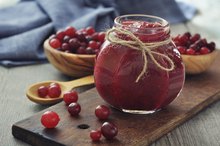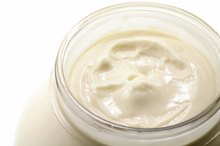List of Natural Preservatives
Preservatives extend the shelf life of foods, making it possible to enjoy them long after harvest. Preservatives can also help foods retain flavor, color, texture and nutritional value. Natural preservatives have been helping humans maintain adequate food supplies since ancient times 3. Natural food preservatives are usually used for flavor as well as for food preservation purposes 3.
Acids
Acidic foods, such as lemon juice or vinegar, help preserve freshness by increasing the acidity of a food. An acidic food creates a hostile environment for microorganisms. The active component in lemon juice is citric acid, a natural preservative you may read on an ingredients list. Citric acid, however, is not always derived from citrus fruits; it is often derived from corn. Acetic acid is the active ingredient in vinegar; it is often added to foods in its isolated form as a natural preservative. Acids are frequently used to preserve a wide range of canned and bottled foods and drinks.
- Acidic foods, such as lemon juice or vinegar, help preserve freshness by increasing the acidity of a food.
- The active component in lemon juice is citric acid, a natural preservative you may read on an ingredients list.
Antioxidants
Malic Acid Vs. Citric Acid
Learn More
Antioxidants help keep foods fresh by countering the effects of oxidation. Oxidation causes a food to turn rancid. Citric acid is an antioxidant as well as an acid. Another common natural antioxidant preservative is vitamin E (tocopherols).
- Antioxidants help keep foods fresh by countering the effects of oxidation.
- Citric acid is an antioxidant as well as an acid.
Sugar
Sugar helps preserve foods by absorbing excess water. Without water, microorganisms cannot grow inside a food. Sugar helps jams, jellies, sweet pickles and marmalades stay fresh for many weeks, even after the containers have been opened.
Salt
What Are the Dangers of Heating Mayonnaise?
Learn More
Salt has long been used to prevent meat and fish from spoiling. Like sugar, salt inhibits the growth of microorganisms by reducing the amount of water available to them. Salt is also used to help keep canned foods fresh and flavorful.
Oil
Oil helps foods stay fresh by preventing microorganisms from coming into contact with the food. Oil also reduces the rate of oxidation in a food, which helps prevent it from spoiling quickly. Many traditional recipes call for what seems to be an exorbitant amount of oil (a half cup or more for four to six servings). If you do not need the dish to remain fresh without refrigeration, you may significantly reduce the oil without any sacrifice in flavor.
- Oil helps foods stay fresh by preventing microorganisms from coming into contact with the food.
- If you do not need the dish to remain fresh without refrigeration, you may significantly reduce the oil without any sacrifice in flavor.
Spices
Some spices seem to retard the growth of microorganisms while also reducing the rate of oxidation. These spices include:
- cloves
- mustard
- sage
- thyme
- rosemary
- oregano
These spices may be effective natural preservatives due to their naturally high levels of antioxidants 3.
Preservation Alternatives
Adding preservatives is not the only way to keep foods fresh. Other methods of food preservation include refrigeration, freezing, freeze drying, desiccating and canning. Many preservative-free breads and tortillas, for example, are sold frozen and will not stay fresh for long if left on the kitchen counter.
Related Articles
References
Writer Bio
Linda Basilicato has been writing food and lifestyle articles since 2005 for newspapers and online publications such as eHow.com. She graduated magna cum laude from Stony Brook University in New York and also holds a Master of Arts in philosophy from the University of Montana.








